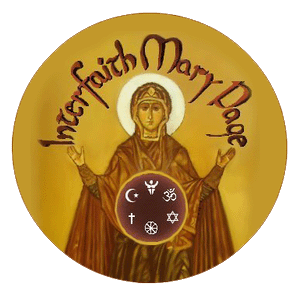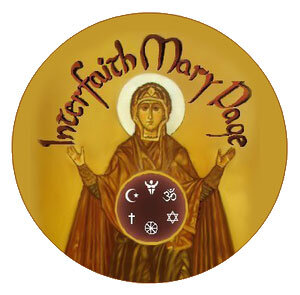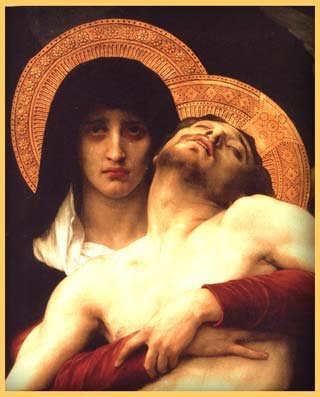Mother Mary In The Bible
Madonna handing Jesus the no longer forbidden fruit of knowledge, 15th century statue in the church "St. Maria Koenigin" in Cologne, Germany
Many people inside and outside the Catholic Church feel that the devotion of those who love Mary is exaggerated, barely Christian, and not grounded in the Bible. Yet the refusal, especially of many Protestants, to acknowledge Mary as anything more than a sort of incubator of Jesus, does far less justice to the message of the Bible.
They ignore Luke 1:48, where Mary says: “Henceforth all generations will call me blessed.” They don’t call her blessed.
They ignore Luke 1:52, where Mary speaks of God and herself when she says: ”He has thrown down the mighty from their thrones but lifted up the lowly.” They want to keep her a lowly handmaid, rather than acknowledge that God lifted his humble servant up to highest honors.
They ignore Revelation 12:1, where the mother of the savior is seen “clothed in the sun, with the moon under her feet, and on her head a crown of 12 stars.” Did not God crown her and clothe her in heavenly bodies, hence making her the Queen of Heaven?
They ignore the part of the story of ‘the wedding at Cana’ (John 2:1-12) where Mary pushes Jesus to start his ministry. She asks him to reveal some of his supernatural powers, ‘his glory’ as the Bible calls it. He says: ”My time has not yet come.” But she seems to know better and pushes him out of the nest, so to say. Is this really just a “lowly handmaid”, or rather an assertive, pro-active Jewish mother?
Mary is present not only at every turn of Jesus’ life on earth, but even before and after. So perhaps, like the magi in Matthew 2:11, who “found the babe with Mary, his mother” we too are to find Jesus with his mother. There is no need to choose one over the other. On the contrary, according to what the Blessed Virgin Mary has said in several apparitions, God wants us to pray to and with both Jesus and Mary.
Let’s look at Mary’s life with Jesus
At his conception, God didn’t force himself on Mary. He very respectfully talked to her until she consented to becoming the virgin-mother of the messiah. So her consent, her "Let it be done according to thy word" (Luke 1:38) was obviously important to God. He could have simply impregnated her and informed her of the fact afterwards. But it seems, part of his plan was to leave the decision up to her. Why? Many Catholic thinkers answer this question by making a connection with Eve, the "Mother of all who live" (Genesis 3:20). In his letter to the Romans 5:18-19 Paul says: "Just as through one transgression condemnation came upon all, so through one righteous act acquittal and life came to all. For just as through the disobedience of one person the many were made sinners, so through the obedience of one the many will be made righteous." Catholics apply this same thought not only to Adam and Jesus, but also to Eve and Mary. Then it reads: "Just like sin and death entered our world through the disobedience of Eve and Adam, forgiveness and eternal life entered through the obedience of Mary and Jesus."
The connection between Eve and Mary is also evident in God’s prophesy in Genesis 3:15 where he says to the serpent, who represents the Devil: "I will put enmity between you and the woman, and between your offspring and hers; He will strike at your head, while you strike at his heel." Here God foretells that although woman was the first to succumb to the devil’s temptations, she will also be the one who leads the fight against Satan. And she will be the one who eventually brings forth an offspring who will crush the Devil’s power (his head) – though it may cost him his bodily life (the bite in the heel).
Regrettably, even among Catholics there is much talk about Mary being nothing without Jesus, of her receiving all her power and grace from him. However, that is not what the Bible says. Here God chose Mary for her own qualities to become his mother. Before she conceived Jesus, God already says to her: "Hail Mary, full of grace, the Lord is with thee. You have found favor with God." (Luke 1:28+30) Martin Luther of all people said: "God is with her, meaning that all she did or left undone is divine and the action of God in her." (See: "Mother Mary and Luther" article) Mary didn’t become holy because Jesus was her son; Jesus became her son because she was already holy. This is not to say that her experiences with Jesus didn’t make her more holy, but that God was already with her and "the power of the Holy Spirit overshadowed her" before Jesus became man. (Luke 1:35) So Mary’s power and grace come from all three persons of the trinity.
Let’s return to the subject of Mary’s obedience for a minute, because it wasn’t a small matter. By consenting to an extra-marital pregnancy, she risked everything. If she couldn’t convince Joseph and many others of the divine origin of her baby, she would certainly loose her fiancé and most likely also her life, because the penalty for adultery was stoning to death. So Mary really needed an incredible faith to participate in God’s plan, and part of that plan was a maiden whose reputation and holiness would help people believe that she conceived from the Almighty. What if she had conceived Jesus only to be stoned to death for adultery?
Obviously, her faith was well placed. God took good care of her by linking her up with Elizabeth, who also conceived miraculously. Then he filled Mary’s older cousin with the Holy Spirit and let her recognize immediately the truth about Mary and her divine baby. In Luke 1:42-43+45 Elizabeth exclaims: "Blessed are you amongst women, and blessed is the fruit of your womb. Who am I that the mother of my Lord should come to me?" Filled by the Holy Spirit, Elizabeth calls both mother and child blessed and she is the first to call Mary "The Mother of my Lord", i.e. the Mother of God. Hence, Elizabeth is the first disciple of Jesus and Mary. Her holy enthusiasm continues: "Blessed are you who believed that what was spoken to you by the Lord would be fulfilled." (Lk 1:45) Overjoyed that God gave her such an ally, Mary responds with a song of praising God, known as the Magnificat. (Lk 1:46-55) What a beautiful example of women supporting each other in the work of God!
Although God took care of Mary, her faith was also severely tested by trial after trial. After the virginal conception she had to give birth to Jesus in a poor and cold stable while on the road. From there, the family proceeds to Jerusalem to present Jesus to God in his temple. Here again God fills a man and a woman (Simon and Ana) with the Holy Spirit to give a message to Mary and to the world. (Lk 2:26-38) God has Simon proclaim that Jesus is the messiah and that both he and his mother will suffer much because of it. In verses 34+35 he says to Mary: "Behold, this child is destined for the fall and rise of many in Israel, and to be a sign that will be contradicted, and you yourself a sword will pierce, so that the thoughts of many hearts may be revealed."
"Pieta" — Detail of painting by William Adolphe Bouguereau
Patriarchal editors have inserted brackets in the text, so as to make it look like Simon’s words about Mary’s suffering ("and you yourself a sword will pierce") were an aside and that the thoughts of many will be revealed only by Jesus’ suffering. But there are no brackets in the Greek text. Simon addresses the trials of Jesus and Mary without missing a beat. So once again, scripture suggests much more team work between man and woman, Jesus and Mary, than people like to admit. From Jesus’ birth in the stable to his death on the cross, Mary accompanied him and shared his pain. His suffering and sacrifice was also her suffering and sacrifice and his joys were also hers.
When Jesus was twelve years old he apparently thought he was ready to leave his earthly parents and to stay in the temple in Jerusalem. Lk 2:41-52 describes how Jesus didn’t want to go home with his family. Living in the temple was a valid option for the extremely devoted, but Mary and Joseph didn’t allow it. Knowing that Jesus was the messiah, Mary apparently felt confident nevertheless that she could prepare him as well for his role as any number of priests and scholars at the temple. His parents commanded him to come home with them "and he was obedient to them". (Lk 2:51) Apparently Mary was right in her confidence, for, as Luke reports: "And Jesus advanced in wisdom and age and favor before God and man." (Lk 2:52)
At the wedding at Cana (John 2:1-12) Mary asks Jesus to help out with a miracle when the party runs out of wine. At first he rebuffs her sharply, saying: “Woman how does your concern affect me? My hour has not yet come.” She ignores his reply, apparently knowing that he won’t really refuse her, and instructs the waiters to do whatever Jesus will ask of them. The rest is history: he turns water into wine and his hour of public ministry has come after all!
John Calvin’s response to this story was to criticize Mary for her desire “to exceed humanity and to make herself an intermediary, which is to forget that grace is totally from God and at His disposal.”* The arrogance of patriarchal thinkers never ceases to amaze me! Obviously God granted Mary’s selfless desire because she knew how to call down that grace that is “totally from God” upon humanity. God must have seen only compassion and wisdom in her request and confirmed her role as intermediary. God wasn’t afraid to empower Mary.
So the wedding feast at Cana is where Catholics get this idea that Jesus can’t refuse any requests submitted to him by his mother.
Mary was not only instrumental at this wedding, but she was also among the first disciples to tour the country with her son. The text says: “After (the wedding) he went down to Capernaum, he, his mother, his brothers, and his disciples.” She wasn’t physically by his side the whole time, but apparently as much as she could. She was still among the disciples at Pentecost, when they all received the Holy Spirit from the risen Christ. Acts 1:13-14 lists the apostles present on the occasion and then adds: "All these devoted themselves with one accord to prayer, together with some women, and Mary the mother of Jesus, and his brothers."
Like the other disciples, Mary sometimes had to go home to look after family, etc. In this she is no different than for example Simon, who in Mark 1:30 attends to his mother in law, when she is seriously ill.
During these years of wandering, the Bible mentions Mary a couple of times in a way that is often interpreted as Jesus saying she wasn’t important, or even disrespecting her. Let’s look at Mark 3:31-35. On a more superficial level, this passage is about a typical Jewish mother telling her son: "Eat! Eat!" Earlier in the same chapter (Mk 3:20-21) Mark describes how so many people beleaguer Jesus and his disciples that they can’t even get around to eating. Apparently this happened more than once, because somebody is concerned enough to send word about it to Jesus’ family. Like any good mother would, Mary thinks her son is going over the edge. How can he keep up his ministry if he doesn’t take time out to eat? She gathers her relatives to go set him straight. Apparently she wants to use her authority and allies to dispel the crowd long enough for her son to eat. That’s how they arrive at the packed house where Jesus is and demand that he come out to them. Sounds like they want to kidnap him and make him eat. But he knows what’s going on and basically tells her: ‘Ma, I’m a big boy now; I know how best to run my life!’ He’s emancipating himself.
However, Jesus usually acts and speaks not only on a worldly but also on a spiritual level. And so he uses the occasion to invite all of his followers into his family. He says: "Who are my mother and brothers? Here are my mother and my brothers. Whoever does the will of God is my brother and sister and mother." (Mk 3:33-35) He invites all of us to do what Mary did when she said: "Let it be done to me according to thy word." (Lk 1:38)
The same theme runs through Luke 11:27-28. Here a woman exclaims: "Blessed is the womb that carried you and the breasts at which you nursed!" And Jesus answers: "Yeah, rather, blessed are they that hear the word of God and keep it." He doesn’t say, ‘no, my mother is not blessed’, he literally says "indeed" (she is blessed for being my mother) "and even more blessed" are all who keep God’s word. Now the same gospel of Luke makes very clear that Mary is the foremost among those who "hear the word of God and keep it". She hears the angel Gabriel at the annunciation and responds with: "Let it be done to me according to thy word". Shortly after wards Elizabeth confirms: "Blessed are you who believed that what was spoken to you by the Lord would be fulfilled." (Lk 1:45). Again in the following chapter, Luke says: "And Mary kept all these things, reflecting on them in her heart." (2:19)
Of course Jesus' emphasis is not on the body that nursed him but on the soul that joins him in doing God's will. We are to follow the example of Jesus and Mary rather than only admire them as something external.
The famous 13th century mystic Master Eckhart voiced the same idea when he said: "What good is it to me, if the eternal birth of the divine Son takes place unceasingly, but does not take place within myself? What good is it to me, for the creator to give birth to his son if I do not also give birth to him in my culture?"
Jesus’ emphasis was always on including as many as he could in the family of God. In this family the most humble are the greatest. So he humbles not only his mother but himself as well. Rather than calling himself Son of God, he prefers to refer to himself as Son of Man. He even says: "Why do you call me good? No one is good but God alone." (Lk 18:19)
Jesus wanted to be our servant and brother and for his mother to be our sister. Is it therefore wrong to think of them as the Son of God and the Mother of God? No, it is wrong to think that God can’t be our Lord and servant, our father and brother, our mother and sister, divine and human. God does not fit into the neat little packages we want to stuff him into. He bursts them all open.
Finally, in John 19:26-27. Here we see her under the cross. Except for the apostle John all the male disciples have fled in fear. Those who risk everything for Jesus are John and 3 Marys: Mother Mary, her sister Mary, and Mary Magdalene. "When Jesus saw his mother and the disciple there whom he loved, he said to his mother, ‘Woman, behold, your son.’ Then he said to the disciple, ‘Behold, your mother.’" – Catholics say that at this moment Jesus gave his mother to all of his disciples as our mother. Apparently this has never occurred to Protestants. Why not? They do know that what is said in the Bible is not just an historical account of what happened between people 2000 years ago. They know that when Jesus addresses his disciples, he addresses all of us. They know that when he says to an individual: "Your sins are forgiven; your faith has set you free." He means all of us. Then why would the Spirit who inspired the Bible not mean all of us when s/he inspired Jesus to say: "Behold, your mother!"?
Footnotes:
*Thomas O’Meara, Mary in Protestant and Catholic Theology, Sheed and Ward, New York: 1965, p.133



